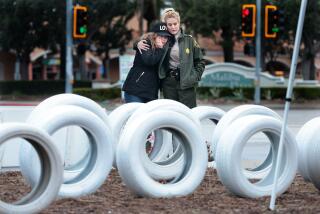Editorials : A Call for Freeway Phones
- Share via
California’s freeways are designed, built, maintained and policed by the state. It logically follows that it should be the state that installs and maintains freeway call boxes so that stranded motorists can quickly summon the help they need.
A bill to accomplish that has been introduced by state Sen. Marian Bergeson (R-Newport Beach), and it deserves more than just a courteous look from the Legislature.
Freeway telephones in Los Angeles County, which has the only ones in operation in California, have proven their worth in nearly two decades of use. It’s time that the rest of the state had them too.
Bergeson’s bill originally called for the state to install freeway phones in Orange County, but she amended it to include all of California because in dealing with safety she did not think it right not to include all counties. She was prompted to introduce the bill by the number of people, especially women, who have been stranded and have called to ask her why Orange County and other areas do not have freeway phones.
The only answer in Orange County, and elsewhere we suspect, is money.
We have heard of no opposition to the installation of freeway phones. They not only provide security for motorists and help ease freeway congestion but they also cut the critical response time of emergency vehicles--which in some instances can mean the difference between life and death--because they are connected to the California Highway Patrol.
Orange County first considered installing call boxes on its freeways in the 1960s. The supervisors were interested until the state rejected the county board’s request to pay half of the installation and operating costs.
We’re glad Bergeson has revived the issue on the state level. This time state officials should consider starting the program, at least in such heavily traveled urban counties as Orange and San Diego, and financing it with money from gasoline taxes, budget surpluses or federal traffic safety subsidies. They even could consider a cost-sharing formula or going to the voters to ask them whether they want a tax increase to pay for the phones.
In 1968, the highway code was amended to permit the state to join with local agencies in paying for such freeway projects as the roadside call boxes. It’s time that financial cooperation began with freeway phones.
More to Read
Sign up for Essential California
The most important California stories and recommendations in your inbox every morning.
You may occasionally receive promotional content from the Los Angeles Times.













